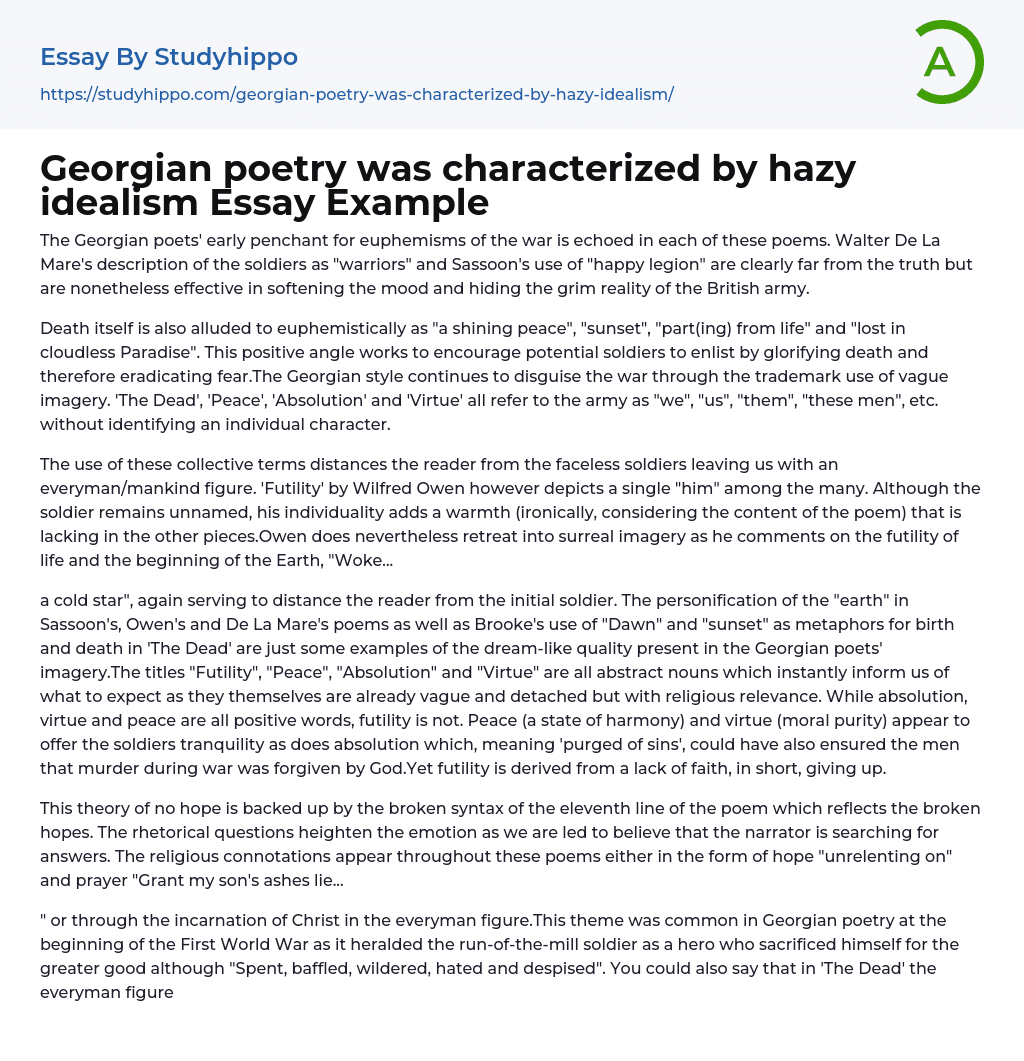

Georgian poetry was characterized by hazy idealism Essay Example
Each of these poems reflects the Georgian poets' initial inclination towards using euphemisms to describe the war. While Walter De La Mare refers to soldiers as "warriors" and Sassoon uses the phrase "happy legion," these descriptions are far from accurate. Nevertheless, they serve to mollify the atmosphere and conceal the somber truth about the British army.
Within the Georgian style, death is indirectly referred to as various positive phrases such as "a shining peace," "sunset," "part(ing) from life," and "lost in cloudless Paradise." By portraying death in this way, potential soldiers are enticed to enlist as it glorifies the concept of mortality and diminishes fear. The use of vague imagery remains a trademark within the Georgian style, with terms such as 'The Dead,' 'Peace,' 'Absolution,' and 'Virtue' all referring to the army as a collective group using prono
...uns such as "we", "us", "them," and "these men" without identifying any specific individual.
The employment of collective terms creates a disconnection between soldiers and readers, portraying them as a general, rather than individual entities. In contrast, Wilfred Owen's "Futility" places focus on a solitary soldier referred to only as "him", providing a sense of empathy lacking in other works. Despite this, Owen still utilizes surreal elements to convey the insignificance of existence and the origins of our planet, with lines such as "Woke up this morning / to find her lying at his feet".
In the Georgian poets' works, imagery often has a dream-like quality, which serves to distance the reader from the initial soldier. Examples include the personification of "earth" in Sassoon's, Owen's and De La Mare's poems, as well as Brooke's use of "Dawn" and "sunset" as metaphor
for birth and death in 'The Dead'. The titles of the poems, such as "Futility", "Peace", "Absolution" and "Virtue", are abstract nouns that hint at what to expect. While peace and virtue offer tranquility, absolution suggests forgiveness for sins, possibly including murder during war. In contrast, futility implies a lack of faith or giving up.
The idea of hopelessness is supported by the fragmented syntax in the poem's eleventh line, which mirrors the shattered dreams. The poignant effect intensifies with the use of rhetorical questions, suggesting the narrator's quest for solutions. References to religion crop up frequently in these poems, such as in the persistence of hope and supplication, "Grant my son's ashes lie...
During the beginning of World War I, the theme of the everyman as a hero sacrificing themselves for the greater good was popular in Georgian poetry, often represented through the incarnation of Christ. This is evident in 'The Dead', where the everyman figure becomes Christ in the twelfth line, leaving behind a white unbroken glory and gathered radiance symbolizing a return to innocence. The use of sibilance and softening of 't's to 'th's enhances the surreal imagery and emphasizes this peaceful brilliance.
The state of perfection that Christ embodies is arguably revealed through the phrase "unbroken glory". Although Brooke's poem does not directly refer to death, its title, 'The Dead', alludes to the harsh reality of mortality. Despite this, the poem's language is gentle, using euphemisms and romantic imagery such as "colours", "music", "flowers", "laughter", and "rich skies". The deliberate peaceful atmosphere, aided by frequent caesuras that slow the pace of the poem, creates an artificial sense of serenity that can be labeled as
'hazy idealism'.
- Allegory essays
- Alliteration essays
- Comedy essays
- Comic book essays
- Drama essays
- Dystopia essays
- Fairy Tale essays
- Fantasy essays
- Fiction essays
- Ghost essays
- Gothic Fiction essays
- Gothic Literature essays
- Irony essays
- Legend essays
- Memoir essays
- Novel essays
- Poetry essays
- Satire essays
- Science Fiction essays
- Short Story essays
- The western essays
- Tragedy essays
- Witchcraft essays
- Belief essays
- Deontology essays
- Ethical dilemma essays
- Moral essays
- Normative Ethics essays
- Values of Life essays
- Virtue essays
- Virtue Ethics essays
- Work Ethic essays
- Aldous Huxley essays
- Alice Walker essays
- Amy tan essays
- Anne Bradstreet essays
- Anton Chekhov essays
- Arthur Miller essays
- Augustine essays
- Bertolt Brecht essays
- Booker T Washington essays
- Carol ann duffy essays
- Charles Dickens essays
- Charlotte Perkins Gilman essays
- Chinua Achebe essays
- Christina Rossetti essays
- Consider The Lobster essays
- Edgar Allan Poe essays
- Elizabeth Bishop essays
- Emily Dickinson essays



